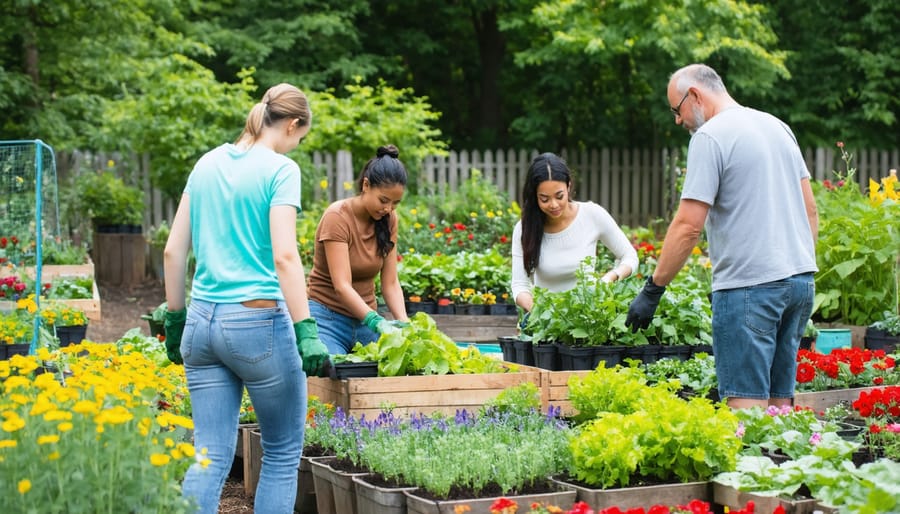God’s first command to humanity was to “tend and keep” the garden (Genesis 1:28), establishing environmental stewardship as a fundamental Christian responsibility. This divine mandate calls us to be thoughtful caretakers of creation, not just for our own benefit, but as faithful servants managing what belongs to our Creator.
Today, as our world faces unprecedented environmental challenges, this biblical calling takes on renewed urgency. Scripture provides a clear framework for environmental stewardship that bridges faith and action. From the Psalms declaring that “the earth is the Lord’s and everything in it” (Psalm 24:1) to Jesus’ parables about faithful management of resources, the Bible consistently emphasizes our role as guardians of God’s creation.
This stewardship reflects both our obedience to God and our love for our neighbors, including future generations. It demonstrates our understanding that creation care isn’t merely an environmental issue – it’s a profound expression of worship, acknowledging God’s sovereignty and showing gratitude for His gifts. As Christians, we’re called to lead by example in protecting and nurturing the natural world, demonstrating how faith-inspired environmental stewardship can bring healing to our planet while honoring its Creator.
In this exploration of biblical environmental stewardship, we’ll discover practical ways to fulfill this sacred responsibility while deepening our relationship with God through creation care.
The Biblical Foundation for Environmental Care
Genesis and the Original Mandate
The foundation of biblical environmental stewardship begins in the opening chapters of the Genesis creation stories, where God establishes humanity’s role in caring for His creation. In Genesis 1:28, God blesses humans and gives them dominion over the earth, but this divine mandate is often misunderstood. Rather than granting unlimited authority to exploit creation, this verse establishes humans as God’s representatives, entrusted with the responsibility to manage and care for His world.
This understanding becomes clearer in Genesis 2:15, where God places Adam in the Garden of Eden “to work it and take care of it.” The Hebrew words used here – “abad” (to work or serve) and “shamar” (to keep, watch, or preserve) – reveal the true nature of our calling. We are called to be both cultivators and protectors of God’s creation, maintaining a delicate balance between use and preservation.
This original mandate remains relevant today, serving as a spiritual foundation for environmental stewardship. Just as a loving parent entrusts valuable possessions to their children, God has entrusted His creation to us, expecting responsible care and management. This sacred duty calls us to approach environmental concerns not just as global citizens, but as faithful stewards answering to the Creator Himself.

Creation’s Worth in God’s Eyes
Throughout Scripture, we see abundant evidence of God’s deep care and concern for all His creation, not just humanity. In Psalm 104, we find a beautiful portrait of God as the sustainer of all living things, providing food for wildlife and making “plants for people to cultivate” (Psalm 104:14). This divine care extends to the smallest creatures, as Jesus himself noted that not even a sparrow falls to the ground outside of God’s notice (Matthew 10:29).
The Bible reveals that creation itself has inherent worth beyond its utility to humans. When God completed His work of creation, He declared everything He had made to be “very good” (Genesis 1:31). Even before humans were created to tend the garden, each element of creation had value in God’s eyes. The book of Job provides particularly rich insights into God’s relationship with nature, as He describes His intimate knowledge of mountain goats giving birth and His joy in creating creatures like the behemoth and leviathan (Job 38-41).
Moreover, Scripture tells us that creation actively praises its Creator. Psalm 148 portrays a magnificent scene where everything from sea creatures to mountains, wild animals to fruit trees, joins in a chorus of praise to God. This reminds us that caring for creation isn’t just about preserving resources for human use – it’s about protecting God’s beloved handiwork that brings Him glory and participates in worship of its Creator.
Stewardship as Worship

Honoring the Creator Through Creation Care
When we actively care for God’s creation, we express our deepest gratitude to the Creator who entrusted us with this precious gift. Just as an artist is honored when their work is preserved and appreciated, our environmental stewardship becomes an act of worship that glorifies God. Through Jesus’s call to care for creation, we understand that tending to the environment isn’t just about preserving resources – it’s about honoring the divine artistry woven into every aspect of nature.
Scripture reminds us in Psalm 24:1 that “The earth is the Lord’s, and everything in it.” When we protect endangered species, reduce pollution, or plant trees, we’re acknowledging God’s sovereignty and demonstrating our love for Him through our actions. This stewardship becomes a testament to our faith and a way to show reverence for the intricate systems He designed.
Moreover, caring for creation allows us to participate in God’s ongoing work of renewal and redemption. It’s an opportunity to reflect His character of love, wisdom, and careful attention to detail in our own lives while inspiring others to see His glory revealed in nature.
Environmental Care as Christian Witness
Our environmental stewardship serves as a powerful testimony to God’s love and our commitment to His creation. When we actively care for the environment, we demonstrate Christ’s character through our actions, showing others that our faith extends beyond church walls into practical care for God’s world. This witness becomes particularly powerful when we explain that our motivation stems from our love for the Creator and our role as His appointed caretakers.
By practicing environmental stewardship, we create opportunities to share our faith naturally. When others notice our careful treatment of resources, recycling efforts, or sustainable practices, they often ask about our motivations. These conversations open doors to discuss how our faith influences our daily choices and share the biblical perspective on creation care.
Moreover, environmental stewardship allows us to demonstrate Christian values of sacrifice, responsibility, and concern for others. When we make choices that prioritize the well-being of creation and future generations, we reflect Jesus’s sacrificial love and show that our faith leads to tangible actions that benefit all of God’s creation. This practical expression of faith can inspire others to consider both environmental responsibility and the Christian worldview that motivates it.
Practical Steps for Christian Environmental Stewardship
Personal Habits and Choices
Living as faithful stewards of God’s creation begins with our daily choices and personal habits. As we read in 1 Corinthians 10:31, “So whether you eat or drink or whatever you do, do it all for the glory of God.” This principle extends to how we interact with the environment in our everyday lives.
Start by practicing mindful consumption, choosing products that minimize waste and environmental impact. This can include using reusable bags, water bottles, and containers, reflecting the biblical principle of good stewardship. Consider maintaining a home garden, which not only provides sustenance but also helps us connect with God’s creation, much like Adam’s role in tending the Garden of Eden.
Energy conservation aligns with biblical stewardship by demonstrating responsibility with resources. Simple actions like turning off unnecessary lights, using energy-efficient appliances, and being mindful of water usage reflect our commitment to caring for God’s creation. These choices echo Proverbs 21:20, which praises the wise steward who carefully manages resources.
Transportation choices also matter. When possible, consider walking, cycling, or carpooling, reducing our environmental impact while building community. These choices can become opportunities for fellowship and witnessing, showing others how our faith influences every aspect of our lives.
Reducing waste through recycling, composting, and careful purchasing decisions demonstrates respect for God’s creation. Remember that everything we have comes from God, and we are called to be responsible managers, not wasteful consumers. By making thoughtful choices in our daily lives, we honor God’s command to care for His creation while setting an example for others to follow.
Church and Community Initiatives
Churches have a unique opportunity to lead environmental stewardship within their communities through organized initiatives that bring believers together in caring for God’s creation. Many congregations are implementing successful programs that demonstrate their commitment to environmental responsibility while strengthening fellowship and community bonds.
Start by forming a “Creation Care” ministry team to coordinate environmental efforts and educate the congregation. This team can organize activities such as church-wide recycling programs, community clean-up days, and sustainable gardening projects. Consider establishing a church vegetable garden that can provide fresh produce for local food banks while teaching stewardship principles to children and adults alike.
Energy conservation initiatives in church facilities set an excellent example for the congregation. Simple steps like switching to LED lighting, implementing programmable thermostats, and conducting energy audits can reduce both environmental impact and operational costs. These savings can then be redirected toward other ministry needs.
Educational programs are vital for fostering environmental awareness within the church community. Sunday school lessons, Bible studies, and workshops can explore biblical teachings about creation care while providing practical tips for sustainable living. Consider hosting guest speakers who can share expertise on environmental topics from a Christian perspective.
Partner with other local churches and faith-based organizations to maximize impact. Joint initiatives might include neighborhood beautification projects, tree-planting ceremonies, or environmental awareness campaigns. These collaborative efforts not only benefit the environment but also strengthen the broader Christian community’s witness through unified action.
Remember that small steps taken collectively can lead to significant positive change. As Ecclesiastes 4:9-10 reminds us, “Two are better than one, because they have a good return for their labor.”

Teaching Children Biblical Stewardship
Teaching children about biblical environmental stewardship is crucial for nurturing a generation that understands their God-given responsibility to care for creation. By introducing these concepts early, we help young ones develop a lifelong commitment to renewing God’s creation and honoring His design for the earth.
Start by helping children understand their special role in God’s creation through simple, engaging activities. Create a small garden together, teaching them about plant growth and the miracle of seeds. This hands-on experience helps them grasp concepts like responsibility and care while witnessing God’s creation unfold.
Make environmental stewardship part of daily family devotions by reading relevant Bible passages, such as Genesis 2:15, where God instructs Adam to tend and keep the garden. Use age-appropriate examples to explain how caring for the environment is an act of worship and obedience to God.
Encourage children to participate in practical conservation activities:
– Starting a recycling program at home
– Creating bird feeders from recyclable materials
– Participating in community clean-up events
– Learning about water conservation through simple household practices
– Helping to plant trees in your neighborhood
Incorporate environmental stewardship into prayer time by teaching children to thank God for His creation and ask for wisdom in caring for it. Help them develop gratitude for nature’s resources and understand their role in preserving them for future generations.
Remember to celebrate their efforts and achievements in environmental care, reinforcing the connection between faith and responsible stewardship. Share stories of how their actions make a difference and help them see how their small contributions fit into God’s bigger plan for creation care.
As we reflect on God’s call to be faithful stewards of His creation, we must recognize that environmental stewardship is not merely an optional aspect of our faith but a fundamental expression of our love for God and our neighbors. Through Scripture, we see that caring for the environment is deeply intertwined with our spiritual journey and our responsibility as Christians.
The biblical mandate for environmental stewardship challenges us to move beyond passive acknowledgment to active engagement. Just as God tends to His creation with love and care, we are called to mirror His character in our relationship with the natural world. This calling requires both individual commitment and collective action within our faith communities.
As followers of Christ, we have the unique opportunity to demonstrate God’s love through our environmental practices. Simple daily choices—reducing waste, conserving energy, supporting sustainable practices, and teaching others about creation care—become acts of worship when done in service to our Creator. These actions not only honor God but also serve as a powerful witness to a world increasingly concerned about environmental challenges.
Let us remember that environmental stewardship is about more than preserving natural resources; it’s about fulfilling our role in God’s redemptive plan for all creation. As Romans 8:19-21 reminds us, all of creation eagerly awaits its liberation from bondage, and we play a crucial part in this restoration process.
Today, I encourage you to take concrete steps in becoming a better steward of God’s creation. Start with prayer, asking for wisdom and guidance in caring for the environment. Then, take action in your home, church, and community. Share these biblical principles with others, and work together to protect and preserve the wonderful world God has entrusted to us.
By embracing our role as environmental stewards, we not only honor our Creator but also leave a legacy of faithful obedience for future generations. Let us move forward with hope, knowing that our efforts to care for creation matter to God and contribute to His kingdom purposes.
